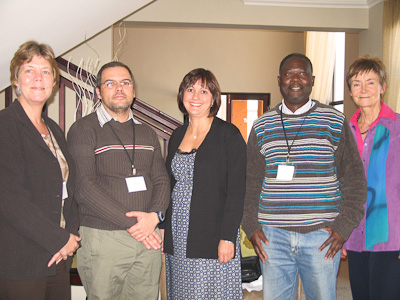Latest News Archive
Please select Category, Year, and then Month to display items
12 October 2020
|
Story Arina Engelbrecht
|
Photo Supplied
 Arina Engelbrecht from Organisational Development and Employee Well-being believes physical activity has a number of benefits for one’s health, including stress relief.
Arina Engelbrecht from Organisational Development and Employee Well-being believes physical activity has a number of benefits for one’s health, including stress relief.
Being physically active plays a big role in preventing the development of mental-health problems and in improving the quality of life of people experiencing mental-health problems.
Treatment for depression
Physical activity can be an alternative treatment for depression. It can be used as a stand-alone treatment or in combination with medication and/or psychological therapy. It promotes all kinds of changes in the brain, including neural growth, reduced inflammation, and new activity patterns are formed that promote feelings of calm and well-being. It releases endorphins – powerful chemicals in the brain that energise your spirit and make you feel good.
Physical activity can be very effective in relieving stress. Research in adults has found that physically active individuals tend to have lower stress levels compared to individuals who are less active. It also leads to improved sleep. When a person sleeps better and feels more rested, overall quality of life improves. They cope better with daily life stressors.
Reduce Alzheimer's risk
Regular physical activity can reduce your risk of developing Alzheimer's disease by up to 50%. It can also slow down further deterioration in those who have already started to develop cognitive problems. It stimulates the brain’s ability to maintain old connections as well as to make new ones.
A study asked people to rate their mood immediately after periods of physical activity (e.g. going for a walk/run, cycling, doing housework) and periods of inactivity (e.g. reading a book or watching television). Researchers found that participants felt more content, more awake, and calmer after being physically active compared to after periods of inactivity.
In conclusion, people who are physically active feel a sense of well-being, feel more energetic throughout the day, sleep better at night, have sharper memories, and feel more relaxed and positive about themselves and their lives.
“Being physically active not only changes your body, it changes your mind,
attitude, and your mood.” – Arina Engelbrecht
International social sciences workshop held at the UFS
2010-08-19
 |
From the left: Prof. Julia Littell, Bryn Mawr College; Prof. Frikkie Booysen, Department of Economics at the UFS; Prof. Terri Pigott, Loyola University; Moses Okumu, Centre for Development Support at the UFS; and Prof. André Dannhauser from the Department of Nutrition and Dietetics at the UFS.
Photo: Lize du Plessis |
An international workshop entitled “Systematic reviews and Meta-analysis of the social sciences” was held in collaboration with the Faculty of Economic and Management Sciences and the New Frontiers on Sustainable Development Cluster at the University of the Free State (UFS).
The presenters, Proff. Julia Littell, from Bryn Mawr College, and Terri Piggot, from Loyola University in the United States of America (USA), discussed topics on the logic and methods of research synthesis, the summary of steps involved in the review process, problem formulation, data collection, data evaluation, data analysis and interpretation and development of protocols for a systematic review and meta-analysis.